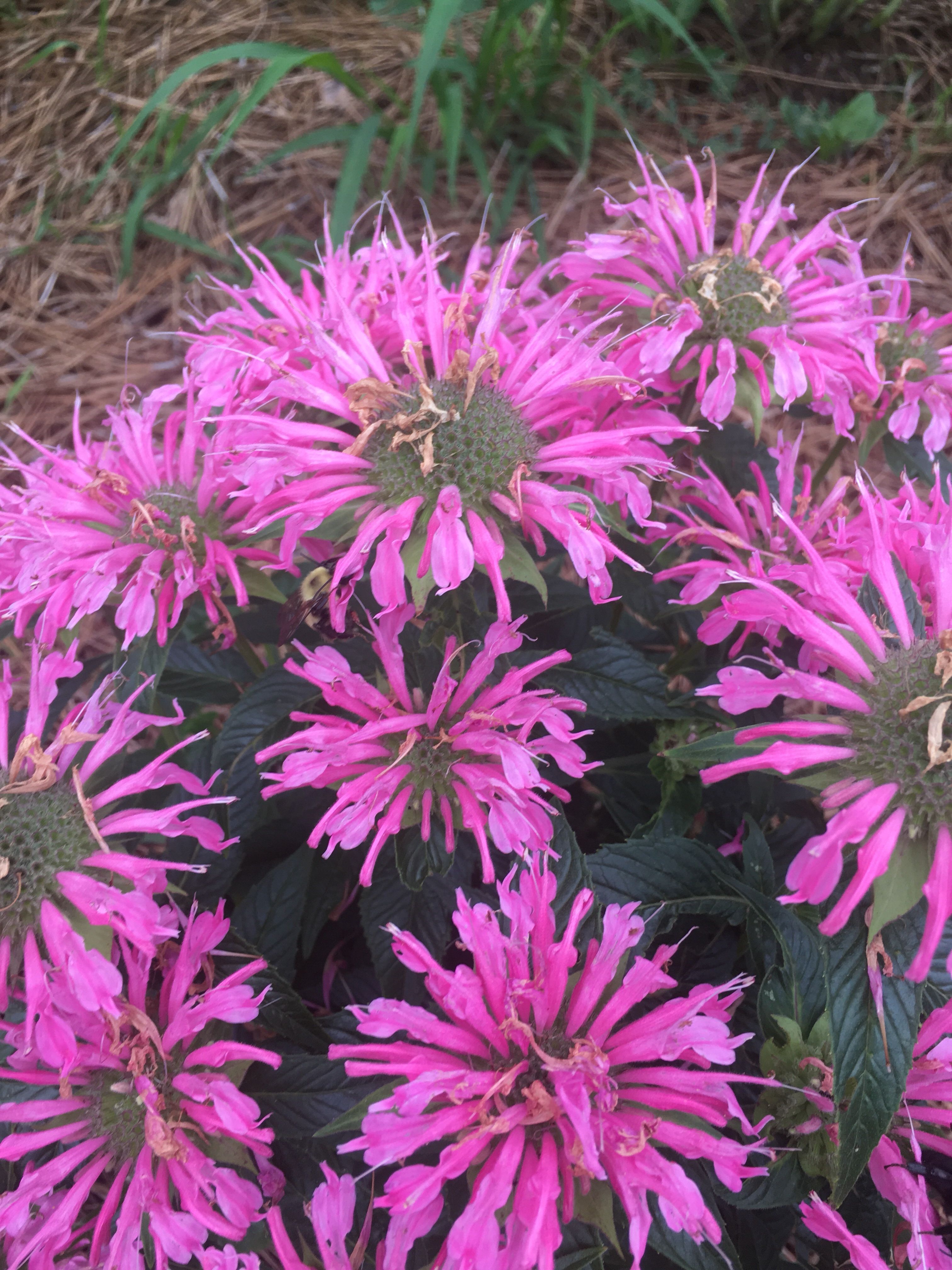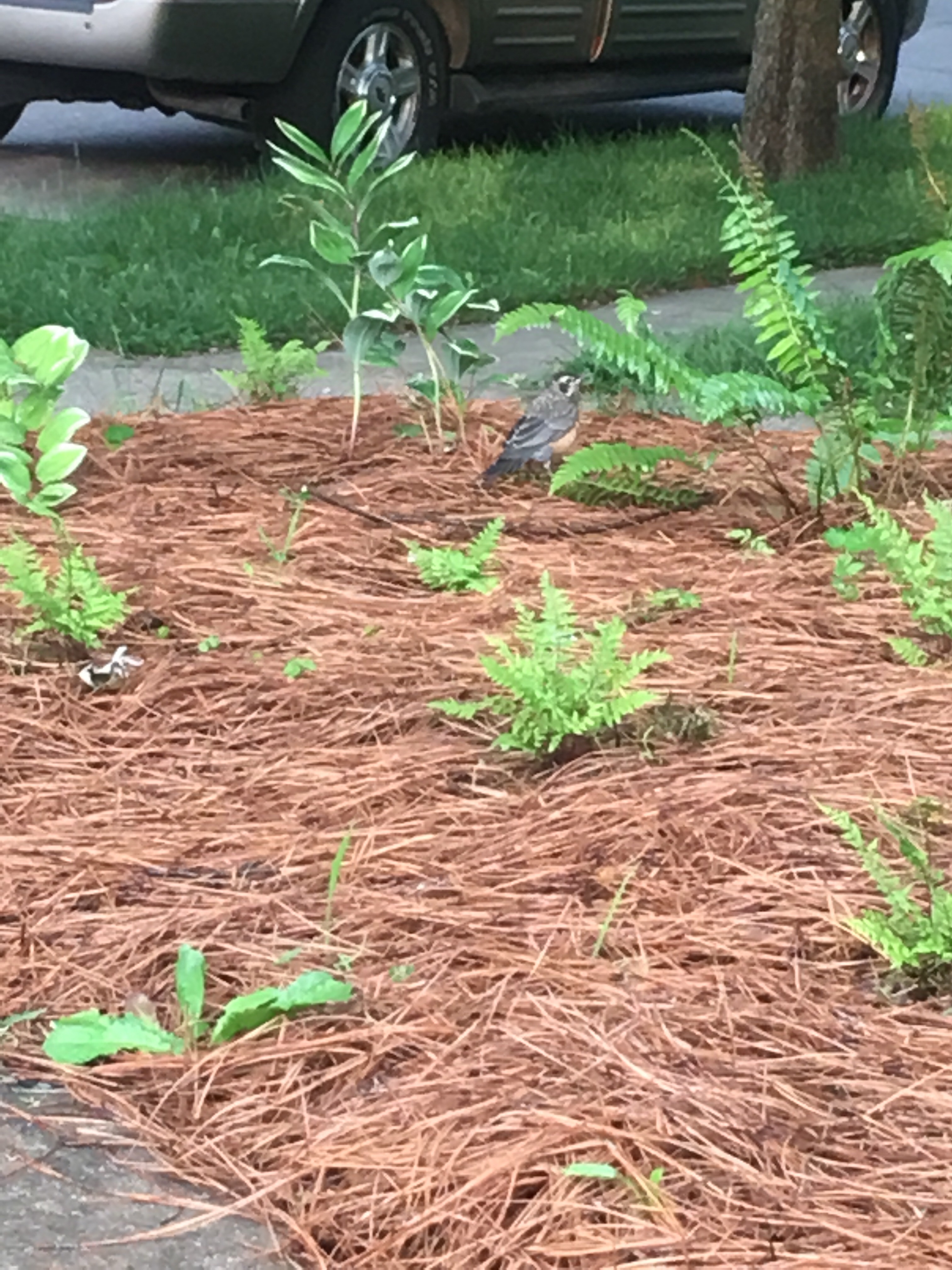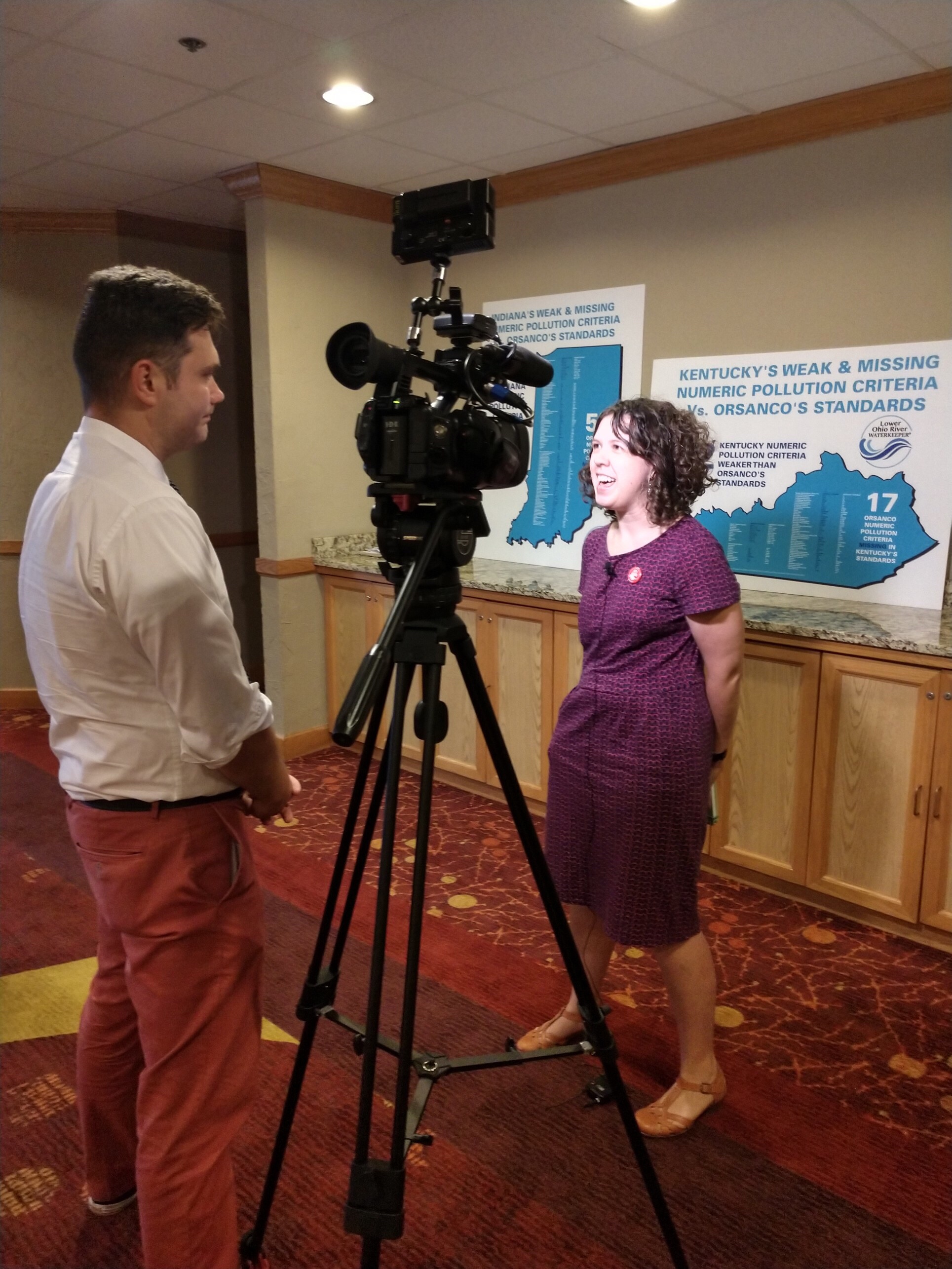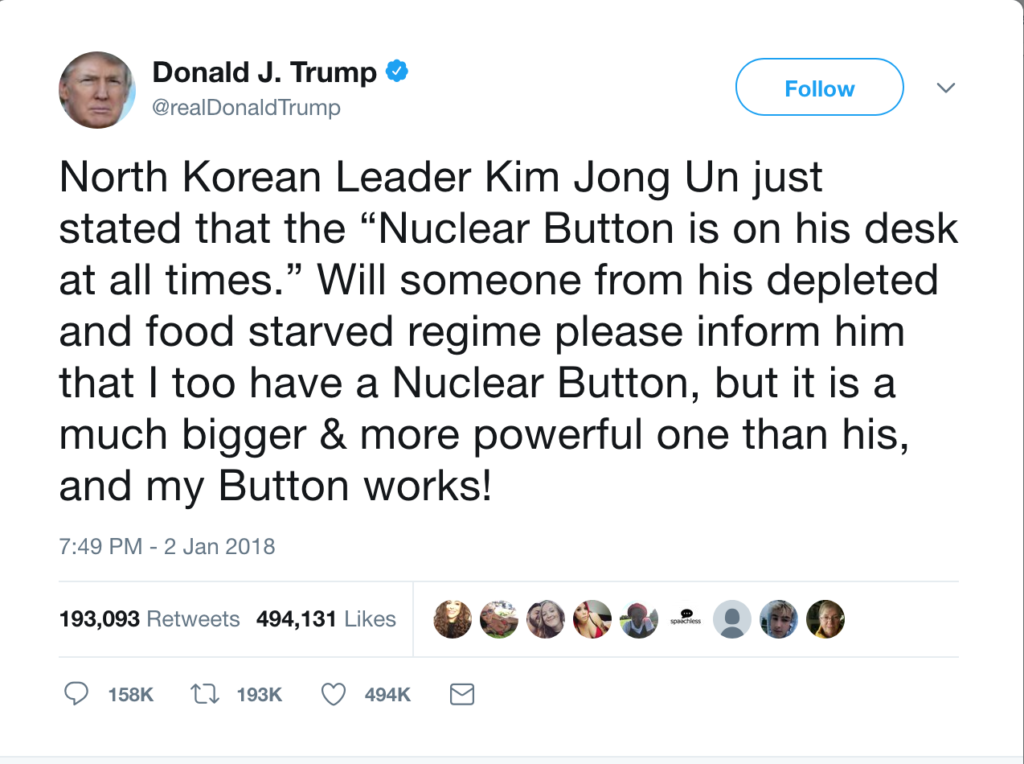Bearing witness for our kin
The big change around our house these days is quite literally around our house. Working with an organic landscaping business, we ripped out our front yard and replaced the grass with a variety of native and pollinator-friendly plants. Whenever we tell people about this, one of the first questions folks have is “How do the neighbors feel?”

Bee balm

I’m delighted to report the neighbors are pretty into it. The front yard still requires a considerable amount of weeding (something we hope will taper off as the plants grow together), so I’m often out working in the front yard on weekends. I’ve met more of my neighbors just in the last few months than I ever did mowing my lawn, and many of them stop to say how much they enjoy our yard.
But the sweetest joy of our yard has been seeing the bees and other pollinators working the plants. The world may be collapsing around us, and indeed bees are in the insect canary in the coal mine. But I feel like with every bunch of flowers, I’m throwing them a small life raft. There are few everyday sights that move me as much as watching bees enthusiastically buzz around flowers.
###
I recently saw Robin Kimmerer speak at FGC Gathering (a large conference for Quakers). Kimmerer is a professor in the SUNY system, and the author of Braiding Sweetgrass. Robin’s talk was incredibly moving, but what stayed with me was her call for transitioning from the “it-ness” we ascribe to non-human animals and plants and natural elements. We refer to birds as ‘it,’ we refer to trees as ‘it,’ we refer to rivers as ‘it.’
Kimmerer called on us to consider using kin as “a pronoun for the revolution”, inspired by her indigenous language, for the creation around us. She notes how and why to use “kin”:
Kin are ripening in the fields; kin are nesting under the eaves; kin are flying south for the winter, come back soon. Our words can be an antidote to human exceptionalism, to unthinking exploitation, an antidote to loneliness, an opening to kinship.
The day after I heard Robin speak, I was checking the news and saw one of the most profound acts of bearing witness to our kin in recent memory. A mother with her child on her hip confronted Scott Pruitt, a man who probably thinks of anything winged or feathered or mossed or leafed as “it”, saying to him:
“Hi, I just wanted to urge you to resign because of what you’re doing to the environment and our country,” Kristin Mink told Pruitt inside a Teaism restaurant in downtown Washington, not far from the EPA’s Pennsylvania Avenue headquarters. “This is my son. He loves animals. He loves clean air. He loves clean water. Meanwhile, you’re slashing strong fuel standards for cars and trucks, for the benefit of big corporations.”
And a day later Scott Pruitt resigned.
I don’t know whether he resigned because of the mother and her child. I don’t know if it was because Pruitt realized that being a sleazy capitalist selling out future generations involves less harassment if it’s dictated from a board room than a public office. I don’t know if all that righteous Quaker energy pouring out of Toledo was bending something in Washington DC.
But I know that bearing witness for our kin, kin who are collapsing en masse, kin who cannot speak for themselves, is one of the most sacred acts we can engage in as a way of trying to repair so much of what has been broken in the march towards elevating innovation over creation. I’m so grateful to that mother and her child for speaking out for our kin.
###
A few weeks after I was in Toledo I joined about 75 others to go speak out against proposed deregulation of Ohio River pollution control standards at a public hearing, the only public hearing to be held in a region of 5 million people who get their drinking water from the river. As I was driving down the highway the only thing I prayed for was to pack the hearing. And as I crossed the Brent Spence bridge and could see the Ohio river below out of the edge of my vision, I silently said to kin, “I’ll do the best I can for you.”
Many members of the various faith and political communities I’m connected to showed up. And then I yelled at the commissioners for my allotted 5 minutes for public comment and after that I ended up getting interviewed by a local news station.

This is what I said in my testimony:
Good evening commissioners. My name is Eira Tansey. I am from Cincinnati, and I get my drinking water from the Ohio River. I am a member of the Metro Cincinnati-Northern Kentucky Democratic Socialists of America. The Democratic Socialists of America is an organization of over 45,000 people across the United States fighting against a capitalist system that silences the voices of working people.
And that is why I am here today: because only a few years after the water crises of Flint and Standing Rock, we are on the verge of another nightmare in which regulators are more interested in carrying out the wish list of polluting industry than protecting the health of the public.
Make no mistake: the public does not want this commission to abdicate its authority and responsibility for setting regional unified pollution control standards. Many of us want you to make existing standards stronger. Over 97% of the responses from the 900 pages of first round public comments called on you to do just that.
We have been told that a majority of ORSANCO’s commissioners favors Alternative 2, a path towards deregulation that happens to line up with the interests and stated preferences of polluting industry. We have been told that the federal Clean Water Act is sufficient to clean up the river, but this is anything but reassuring. As Mary from West Virginia wrote to you on February 22: “If state and EPA agencies’ work is adequate, why do I keep reading that the Ohio River is the most polluted inland waterway in the country?”
Ohio’s status as one of the dirtiest rivers in the country can be directly traced to several of the companies who have requested this commission to gut pollution standards. Alcoa, AKSteel, American Electric Power, ArcelorMittal, FirstEnergy, Duke Energy, Jupiter and Aluminum have all had dozens of Clean Water Act violations in just the last 3 years.
The majority of the commission has not acted in good faith. ORSANCO’s own reporting has found over 100 pollutants for which it has issued standards that are not found elsewhere within federal or state guidelines. It is outrageous that the only public hearing during this comment period is happening at an out of the way hotel in the middle of the week. It suggests the commission is not very interested in hearing from the public. So we must ask – why is a majority of ORSANCO leadership more interested in protecting polluting industries than in protecting the 5 million individuals who depend on the Ohio River for their drinking water?
Could it be because half of the commissioners have ties to polluting industry themselve? They have either worked directly in the mining and energy industries, or they represented them as clients of their consulting firms and law practices. Commissioner Snavely of Kentucky retired from Excel Mining. Commissioner Caperton of West Virginia worked at Massey Energy. Commissioner Flannery of West Virginia is on the National Coal Council. Commission chair Potesta of West Virginia has represented clients like DuPont, who has been one of the worst polluters of all.
This is not sound science or policy making. This is the fox guarding the henhouse door. If the commission guts regional pollution control standards, it is selling out the health and safety of everyone living downstream from polluting industry for the ability of corporations to make more money.
###
I don’t know what’s next, for the river, for the bees in my yard, for the animals and the toddlers who love them being carried on their mother’s hips. I’m worried for my kin. Bearing witness on their behalf is the only thing I know how to do right now.





